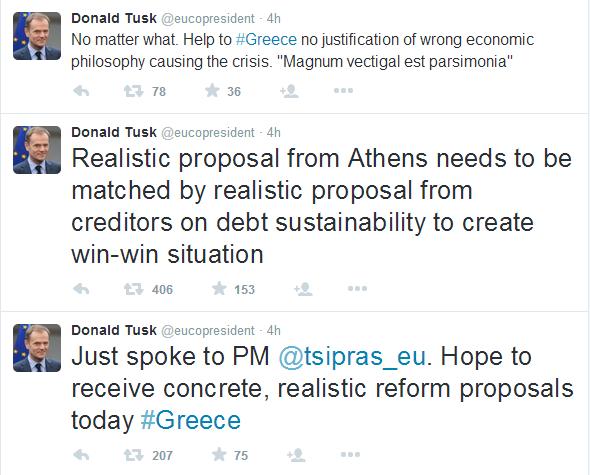Photo: kathimerini.gr
In the final phase of the Greek crisis that will determine whether a third programme for financial support will save Greece or if it will end up outside the euro area, Athens is hectically preparing the proposals to creditors, which it should sent to Brussels by the end of the day.
Prime Minister Alexis Tsipras had held a series of consultations with government members since morning and the cabinet session involving all cabinet members began at 3:00 pm. In order for creditors to accept the reform proposals and budgetary measures, they should be detailed and accurately calculated.
According to the Greek media referring to government sources, Alexis Tsipras has been in constant phone contact with French President Francois Hollande. "It seems that Hollande, who is strongly in favour of keeping Greece in the euro zone, has become a mediator between Athens and creditors over the past few days, aiming to bring the positions of both sides closer and keep the bridges of communication between them," they cite.
Earlier, the British Guardian reported that Paris was helping Athens not only at the political but also at the advisory level. According to journalist Elena Smith, France had sent to Greece a group of technocrats to help new Minister of Finance Efklidis Tsakalotos to compile the list of proposals. The publication cites members of the Greek cabinet, who define as valuable the help of French experts. A little later, in statements to the newspaper Telegraph, a representative of the French president refuted this information. "France wants to support the process towards an agreement but in no case is it taking part in the drafting of Greece’s proposals," he said.
European Council President Donald Tusk, in turn, announced on Twitter that he had also spoke by phone with Greek Prime Minister, referring in his third post to the Latin proverb, "Magnum vectigal est parsimonia" that means, "Economy is a great revenue."

At the same time, there are significant doubts about the reaching of an agreement, both outside and inside Greece.
Asked by the Italian economic magazine Il Sole 24 Ore whether the Greek crisis could be contained successfully, European Central Bank President Mario Draghi replied, "I'm not sure. It is really difficult this time." Commenting on if Greece could rely on financial support from Russia, he stated, "I do not believe. I do not consider it as a real threat...moreover, it itself has no money."
At the same time, Greek Minister for Energy and leader of the left platform in SYRIZA Panagiotis Lafazanis said he was strongly opposed to the adoption of a third bailout to Greece. He pointed out that the negative vote in the referendum could not be turned into a "humiliating YES".
"We do not want a third austerity programme that will give no perspective to the country."
Lafazanis stressed that the Greek government aimed to reach an agreement, but added that it would not carry out privatizations of state-owned energy companies but would continue to invest in the sector.
Today at 7:30 pm, the pro-European Greeks, who are for Greece to stay in the euro zone and the EU will hold a demonstration in Syntagma Square.